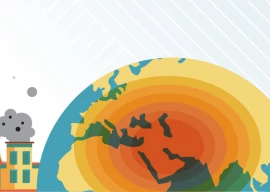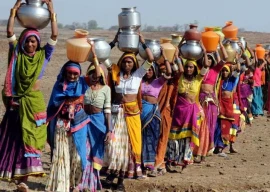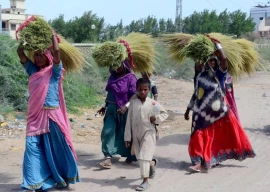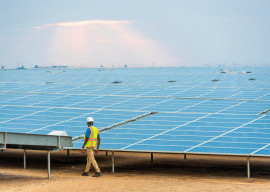
Climate change impacts both human and natural systems. It also poses a challenge to human security. It is a source of conflict which triggers discussions on the importance of climate security globally. Many experts refer to climate change as a threat multiplier which intensifies existing vulnerabilities of communities and nations.
Greenhouse gas emissions in the past decade have hit unprecedented levels. It underlines the need for immediate and substantial reductions across all sectors. Without swift action, limiting global warming to 1.5°C becomes nearly impossible.
Climate change also has a huge impact on the health situation, and cause food scarcity, loss of biodiversity and risks to oceanic life. One of the other dimensions of climate change is human migration as people need food, shelter, water and employment. The environmental challenge increases the risk of stability of some countries making other countries more vulnerable, thus increasing the chances of conflict among them.
Conflicts around the world are also linked to climate change. The Russia-Ukraine war led to disruption in energy markets. Such conflicts cause a significant challenge to the renewable energy infrastructure and result in extensive deforestation, heightened health issues and falling life expectancy. Similar things are happening in the Gaza Strip where conflict has worsened the climate threats. Syrian conflict linked to the droughts and the Gulf War which was the cause of oil fires in the past, demonstrated the environmental toll of warfare. Similarly, territorial disputes and geopolitical tension, particularly in regions like Kashmir and the Himalayas, are exacerbated by climate impacts. During COP28 in December, the conflict and climate relationship was highlighted for the first time and the need was stressed for collaborative efforts to address climate resilience in conflicted-affected regions.
South Asian region is highlighted as the most climate-affected region around the globe. All seven countries in the region are highly vulnerable to climate change. The vulnerability is exacerbated by densely populated coastal areas, leading to concerns about disappearing land masses. The presence of developed military forces in surrounding regions anticipates significant impacts of climate change, prompting preparations for disaster response and conflict prevention. The production of war machinery and military activities contribute significantly to environmental degradation, exacerbating climate breakdown.
Thus, a climate security index has been developed to determine the vulnerability of each South Asian country to climate change and conflicts, based on seven indexes: energy, food, conflict, economy, health, water and land. A study reveals that Bangladesh tops in climate vulnerability and Nepal is positioned at the bottom. Afghanistan is ranked 2nd and Pakistan 3rd, manifesting reduced agricultural productivity, water scarcity, coastal erosion and extreme climatic events. India, meanwhile, is ranked 4th, the Maldives 5th, Bhutan 6th and Sri Lanka 7th.
For tackling this issue, each country has established its unique policies, legislation or legal commitments. Each country has been awarded green climate funds as per their need. Several ongoing projects have been working to address the challenges posed by climate change.
The third-ranked Pakistan only has six green climate projects, prompting the need for a more comprehensive policy framework to combat climate challenges. It is important for Pakistan to adopt comprehensive policy and infrastructure to be more resilient in mitigating climate change impact. This includes preparing for increased temperatures, extreme weather events and modifications in the agricultural sector. Furthermore, there is need for issuance of green bonds and creation of a national climate fund to finance environment-friendly projects. Also important is to enhance the capacity of government institutions to access international climate finance mechanisms, by aligning proposals with criteria and strengthening institutional and technical capabilities.
Published in The Express Tribune, April 26th, 2024.
Like Opinion & Editorial on Facebook, follow @ETOpEd on Twitter to receive all updates on all our daily pieces.












































COMMENTS
Comments are moderated and generally will be posted if they are on-topic and not abusive.
For more information, please see our Comments FAQ